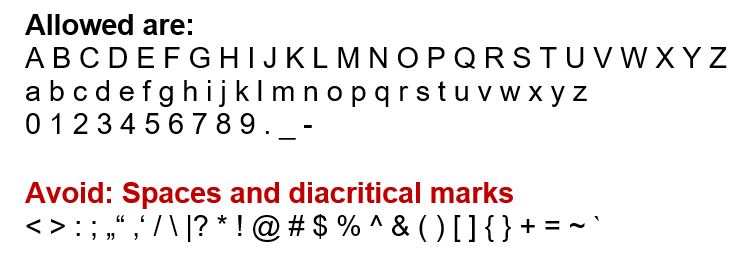Methods: File Naming
General Recommendations
The following elements are usually sufficient for clear file naming. Depending on the context, project, and work environment, some elements may be omitted, or additional ones included (VerbundFDB, 2018):
- Date
- Organization/Project/department affiliation (if applicable)
- Short Title
- Version
- For Teamwork: Author or Editor
The order is not fixed. However, it is generally recommended to place the date first so that files are displayed chronologically. Consistency in using the chosen elements in the same order is crucial.
Avoid spaces, slashes, umlauts, and diacritical marks in file names to ensure machine readability. These special characters can cause compatibility issues across different systems, as they may trigger unwanted effects such as changes to the file name.

Sources: Characters in filenames, Anne Voigt, 2023, licensed under CC BY-SA 4.0
The following possible notations for separating the components of file names have been adopted from the programming languages:

Source: Ways of Separating File Name Components, Anne Voigt, 2023, licensed under CC BY-SA 4.0
Components of the File Name
Date
While every file system records the last modified date of a file, this information may not always be accessible across systems and may be lost during copying/moving/sending. If the date is significant, it should be included in the file name.
- When placed at the beginning, files are displayed chronologically.
- ISO 8601 Format: YYYY-MM-DD (shortened: YY-MM-DD or YYMMDD)
This format is internationally recognized, unambiguous, and can be read by other programs, which is relevant for archiving purposes (Wikipedia, 2023).
Examples
2021-02-10_
2021-02-21_
2021-03-05_
Organization/Project Affiliation
To indicate the context from which a file originates, include an abbreviation for the organization/project in the file name
Examples
Subproject: 2021-02-10_A01
Study: 2021-02-10_SOEP
Short Title of the File
The short title should clearly reflect the content of the file but remain concise. Include enough information in the name so that files and documents can be identified even when detached from their storage context, such as when shared.
Examples
Minutes: 2021-02-10_A01_Minutes-jf
Transcript for Interview 1: 2021-02-10_SOEP_Int01-Transcript
Versioning
VersioningVersioning refers to the documentation of all changes made to research data during the work process. It is recommended to save a new version of the data for each adjustment to ensure traceability. This can be done manually using versioning schemes (e.g., numbering: Version 1.3.2) or by using versioning software like Git. Versioning occurs during the research process itself but can also be applied retrospectively to already published research data to provide third parties with the correct version for reuse. Read More is crucial, especially in team projects, to track changes and understand work processes. Avoid unclear labels like “final2,” “finalfinal,” “FINAL!!!,” or “edited.” Instead, use versioning with “v+numbering” in the file name. Adding a leading zero for the main version number (01, 02, etc.) ensures correct file sorting when there are more than nine versions.
Distinguish between major and minor file changes. For instance:
- The first version: v01-0
- Small updates (e.g., grammar fixes, formatting): v01-1
- Major revisions (e.g., added a chapter, restructured): v02-0
Examples
First version: 2021-02-10_SOEP_Int01-Transcript-v01-0
Minor edits to the first version: 2021-02-10_SOEP_Int01-Transcript-v01-1
First major revision: 2021-02-10_SOEP_Int01-Transcript-v02-0
Author/Editor
Including the name of the last person who worked on a file in the name helps clarify who made changes or where the file originated. Initials are often sufficient.
Examples
First version by one person: 2021-02-10_SOEP_Int01-Transcript-v01-0_XY
Minor edits by another person: 2021-02-10_SOEP_Int01-Transcript-v01-1_YZ
Literature
Verbund Forschungsdaten Bildung. (FDB, 2018). Dateien benennen und organisieren. fdb. https://www.forschungsdaten-bildung.de/dateien-benennen
Wikipedia (2023): ISO 8601. Wikipedia. https://de.wikipedia.org/wiki/ISO_8601
